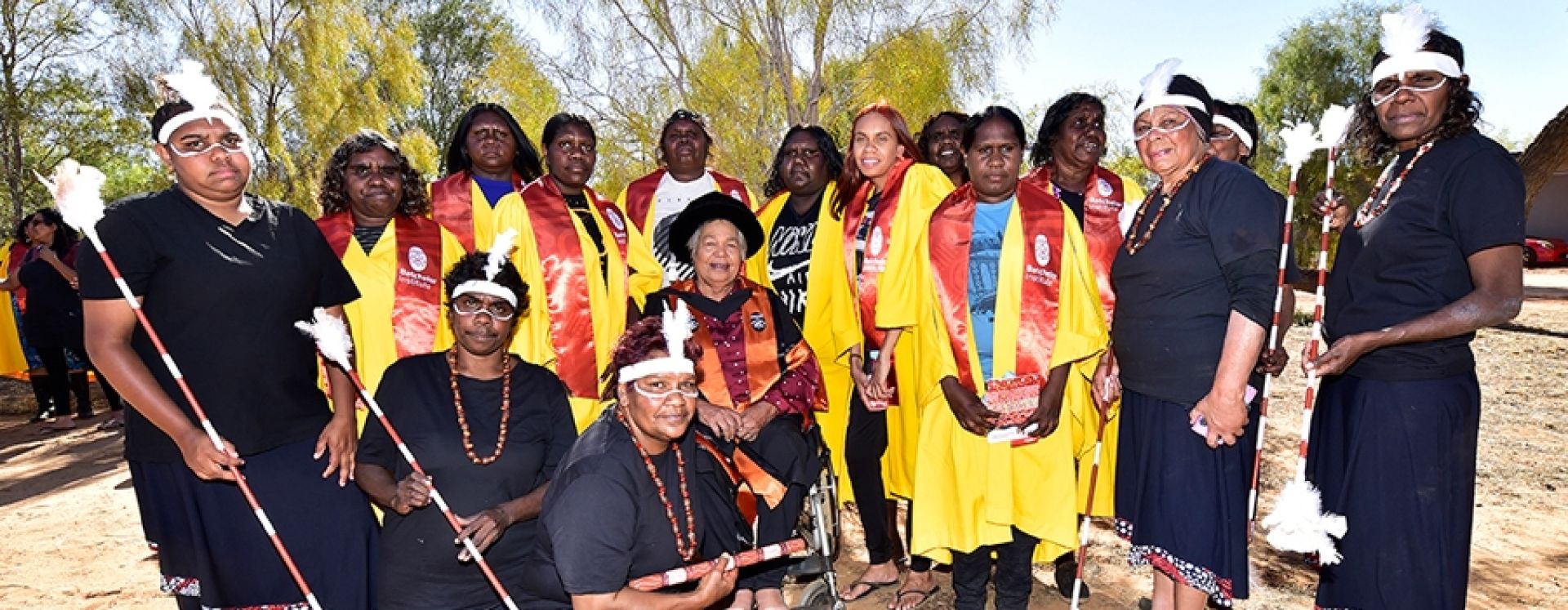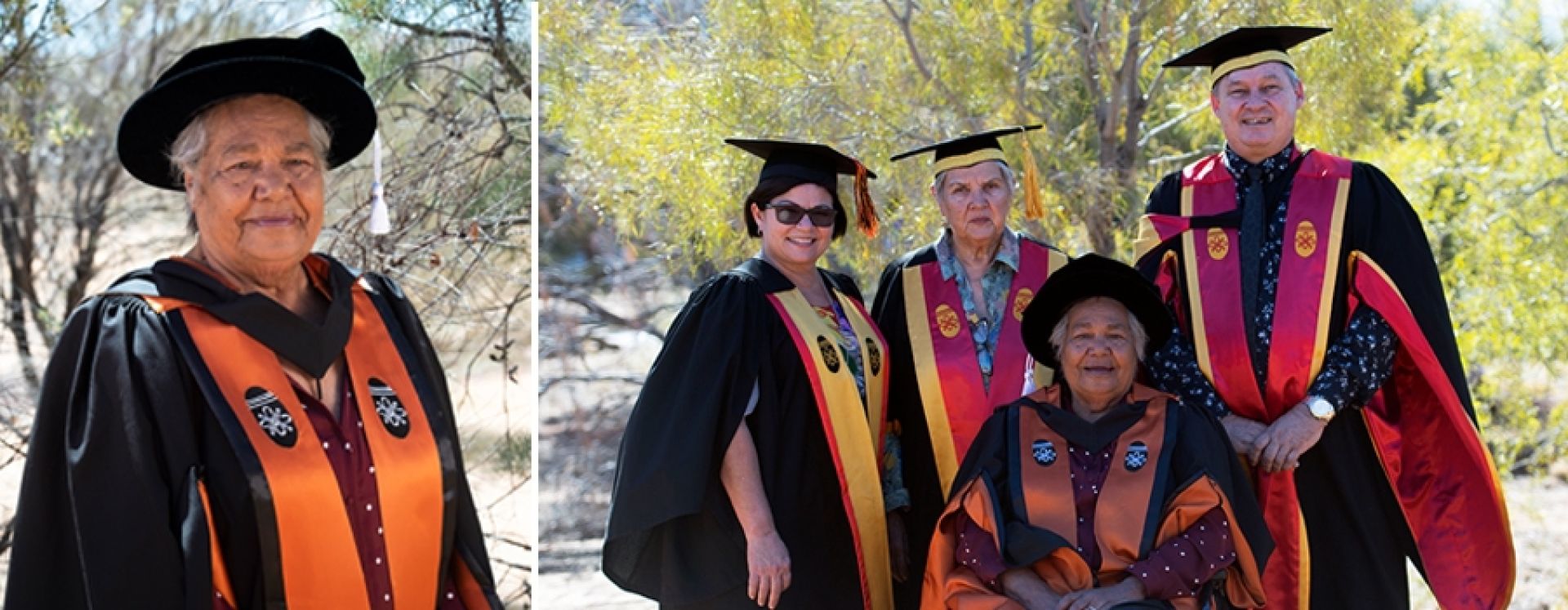

Rosalie Lynette Kunoth-Monks was awarded Batchelor Institute’s second Honorary Doctorate award at our Alice Springs Graduation Ceremony on Thursday 12th of September 2019.
After due consideration by the Council of the Batchelor Institute of Indigenous Tertiary Education, it was determined that Rosalie Lynette Kunoth-Monks should be awarded the honorary degree of Doctor of the Institute Honoris Causa in recognition of her outstanding contribution to the welfare, recognition and advancement of Aboriginal people of Australia, and for services to the Institute as a member and Chairperson of the Institute Council.
CitationfortheawardofHonoraryDoctorate
Rosalie was born in 1937 at Utopia Station in Central Australia and remained on her Country until going to school in Alice Springs at the age of nine. She was 16 when she was discovered by Charles and Elsa Chauvel and cast in the title role “Jedda” in the first Australian colour movie. The film opened her eyes to how big the world is, and that it was not just Utopia and Alice Springs. The film ‘Jedda’ was, and remains, momentous in Australian cinematic history and remains significant enough to be played again 60 years later, in 2015, at the Cannes Film festival.
“Jedda” threw Rosalie and her co-star Robert Tudawali into an unprecedented limelight and, after completing her education, Rosalie withdrew to Melbourne within the Anglican Church. Rosalie became the first Aboriginal Anglican nun and she remained with the order for 10 years.
Rosalie sought a release from her vows feeling called to work with her people. Upon release from the Anglican Church, Rosalie immediately began working with and for the Aboriginal community. Rosalie is credited with setting up the first Aboriginal children’s home in Victoria.
Rosalie married her husband and lifelong partner Bill Monks in 1970 and they settled down in Alice Springs and had one daughter Ngarla Kunoth-Monks. Upon returning to Alice Springs, Rosalie continued her work in social welfare, law and justice, education and childcare; working for Aboriginal Hostels, the Central Australian Aboriginal Legal Service and the Aboriginal and Torres Strait Islander Commission. Rosalie has been a strong activist for Aboriginal wellbeing, rights and culture.
In 1979 Rosalie entered politics to join the legislative assembly to protest a dam being proposed on sacred land outside of Alice Springs. This campaign was successful, and to this day people speak of the fight and win to save the country.
In 1990 the Sydney Morning Herald described Rosalie as a ‘formidable woman’ while the Territory Digest referred to her as a ‘53 year-old firebrand’ whose ‘outspoken rhetoric seems contrary to her kind nature’. Such is Rosalie’s passion for the things that matter – justice, rights, education, culture, wellbeing and advancement of Aboriginal people.
Rosalie has had a long involvement with the Batchelor Institute as both Chair and Deputy Chair of the Institute’s Council. In 1999 Yolgnu Elder, Mr Gatjil Djerrkura OAM became Chairman of the Institute’s Council and Rosalie Kunoth-Monks became the Vice Chair. After his passing Rosalie succeeded Mr Djerrkura as Chair and fought in the boardroom as fiercely as in the streets to ensure First Nations ways of knowing and being were recognised, as legitimate knowledge.
In 2010 Rosalie travelled to Geneva to address the United Nations. Rosalie and the Rev Dr Djiniyini Gondarra OAM, addressed the United Nations meeting of the Committee for the Elimination of Racial Discrimination. This was an important opportunity for Rosalie and the Rev Dr Gondarra to shine a spotlight on issues of racial discrimination that Aboriginal and Torres Strait Islander people experience in an international forum.
In an SBS interview Rosalie said “It was the language, ceremonies and the land that actually made me reach my potential as a human being”. It is this unique perspective that sees Rosalie recognised as a national champion of Aboriginal and Torres Strait Islander rights, particularly in the Northern Territory. Rosalie spoke strongly against the Northern Territory Intervention, the suspension of the Racial Discrimination Act and the issue of Aboriginal Deaths in Custody.
In the words that Rosalie spoke on the ABC’s Q & A program; words that not only epitomise Rosalie but so many Aboriginal and Torres Strait Islander people:
"I have a culture. I am a cultured person (as she spoke in her language). I am not something that fell out of the sky for the pleasure of somebody putting another culture into this cultured being.
I didn’t come from overseas. I came from here…. I am alive. I am here and now. And I speak my language. I practice my cultural essence of me. Don’t try and suppress me and don’t call me a problem. I am not the problem. I have never left my country nor have I ceded any part of it. Nobody has entered into a treaty or talked to me about who I am.
I am Arrernte, Alyawarr female Elder from this country and I am not the problem."
Rosalie has received many awards that formally recognise the work that she has undertaken over many decades. These awards include, but are not limited to:
- an Order of Australia Medal in 1993.
- a “Northern Territory Tribute to Women Award” at the opening of the National Pioneer Women’s Hall of Fame in Alice Springs in 2007.
- The Dr. Mandawuy Yunupingu Human Rights Award at the inaugural National Indigenous Human Rights Awards in 2014.
- Being named as the NT Australian of the Year in 2015.
- Being named as the NAIDOC Person of the Year in 2015.
These awards are formal recognition of Rosalie’s outstanding contribution over many years not only to the welfare, recognition and advancement of Aboriginal peoples of Australia, but also to broader Australian society. Further, while very important, we acknowledge that these awards can only ever capture part of the story of Rosalie’s impact on the lives of Aboriginal people and their communities. This award of Honorary Doctorate is the Institute’s way of recognising and honouring Rosalie’s commitment and service over decades to our organisation and the Aboriginal people of Australia.

